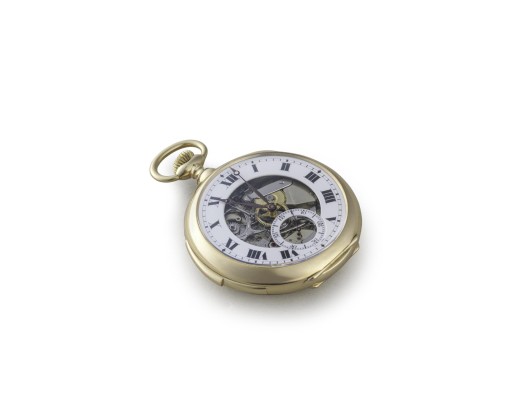Online-Katalog
25. Juni 2025 - Basel Watch Auction
This complicated pocket watch comes from the direct family heirs of Jules Grossmann, also known as Julius Grossmann, 1829–1907, who was a pivotal figure in the evolution of horological education and theory, particularly within Switzerland.
Early Life and Career
Born on July 28, 1829, in Eberswalde, Germany, Grossmann began his career apprenticing with a pendulum clockmaker in his hometown. Seeking to deepen his expertise, he moved to Berlin to work under a master watchmaker. His quest for knowledge led him to London in 1851 and subsequently to Neuchâtel, Switzerland, where he recognized the importance of theoretical knowledge in watchmaking alongside practical skills.
Contributions to Horological Education
In 1868, Grossmann was appointed as the director and sole instructor of the watchmaking school in Le Locle, Switzerland. Under his leadership, the institution became a cornerstone for
horological education, emphasizing both practical craftsmanship and theoretical understanding. His dedication to teaching and curriculum development significantly influenced the standards of watchmaking education in Switzerland.
Collaborative Works and Publications
Grossmann’s commitment to horological education extended beyond the classroom. Collaborating with his son, Hermann Grossmann—who became the director of the watchmaking school in Neuchâtel in 1888— they authored several influential texts.
Notably:
– “Lessons in Horology” (1905):
A comprehensive guide covering the principles of time measurement, mechanics, and watchmaking techniques.
– “Horlogerie Théorique” (1911–1912):
A two-volume work delving into the theoretical aspects of chronometry and applied mechanics.
These publications have been instrumental in shaping modern horological education and are still referenced by watchmakers and scholars today.
Legacy
Jules Grossmann passed away on February 27, 1907, in Le Locle, leaving behind a rich legacy in horology. His emphasis on integrating theoretical knowledge with practical skills set new standards in watchmaking education. The methodologies and curricula he developed continue to influence contemporary horological training programs. While not as widely known as some of his contemporaries, Grossmann’s contributions have had a lasting impact on the field of watchmaking, particularly in fostering a comprehensive approach to horological education that balances theory and practice.
Swiss
No. 4342, circa 1910
A 18k yellow gold skeletonized minute repeating open face keyless pocket watch with red presentation box
Case: hinged circular case with snap on gold plain cuvette, case back with polychrome enamel family crest, numbered
Dial: annular enamel dial with Roman numerals, subsidiary seconds, outer minute track, open in the centre to see the mechanism wheelworks, signed Movement: mechanical with manual winding, lever escapement, nickel highly finished movement, minute repeating with two hammers on gongs
Dimensions: 54 mm
Weight: 109,2 g
Accessories: a red presentation box
CHF 10'000 – 15'000
This complicated pocket watch comes from the direct family heirs of Jules Grossmann, also known as Julius Grossmann, 1829–1907, who was a pivotal figure in the evolution of horological education and theory, particularly within Switzerland.
Early Life and Career
Born on July 28, 1829, in Eberswalde, Germany, Grossmann began his career apprenticing with a pendulum clockmaker in his hometown. Seeking to deepen his expertise, he moved to Berlin to work under a master watchmaker. His quest for knowledge led him to London in 1851 and subsequently to Neuchâtel, Switzerland, where he recognized the importance of theoretical knowledge in watchmaking alongside practical skills.
Contributions to Horological Education
In 1868, Grossmann was appointed as the director and sole instructor of the watchmaking school in Le Locle, Switzerland. Under his leadership, the institution became a cornerstone for
horological education, emphasizing both practical craftsmanship and theoretical understanding. His dedication to teaching and curriculum development significantly influenced the standards of watchmaking education in Switzerland.
Collaborative Works and Publications
Grossmann’s commitment to horological education extended beyond the classroom. Collaborating with his son, Hermann Grossmann—who became the director of the watchmaking school in Neuchâtel in 1888— they authored several influential texts.
Notably:
– “Lessons in Horology” (1905):
A comprehensive guide covering the principles of time measurement, mechanics, and watchmaking techniques.
– “Horlogerie Théorique” (1911–1912):
A two-volume work delving into the theoretical aspects of chronometry and applied mechanics.
These publications have been instrumental in shaping modern horological education and are still referenced by watchmakers and scholars today.
Legacy
Jules Grossmann passed away on February 27, 1907, in Le Locle, leaving behind a rich legacy in horology. His emphasis on integrating theoretical knowledge with practical skills set new standards in watchmaking education. The methodologies and curricula he developed continue to influence contemporary horological training programs. While not as widely known as some of his contemporaries, Grossmann’s contributions have had a lasting impact on the field of watchmaking, particularly in fostering a comprehensive approach to horological education that balances theory and practice.
